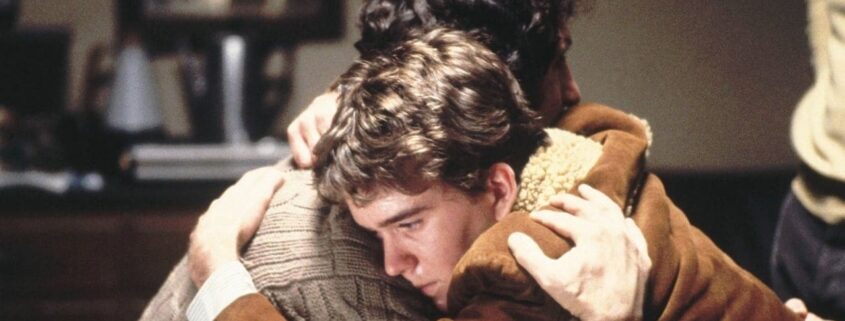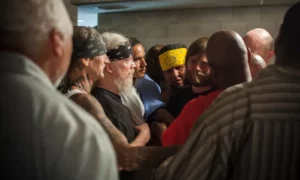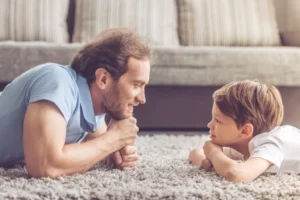Men CAN Do Empathy Too! Here’s How…
(Therapist and young adult client in the classic film, “Ordinary People”)
What’s the difference between the two?
Men running into a burning building or men ‘running into’ their emotions?!
Fire fighters get massive amount of training to run into that building while Men get NO training [with their emotions].
– George Faller (former fire fighter, now couples therapy trainer)
Of course Faller’s statement does not describe ALL men!
I’m sure you know some men who skillfully demonstrate empathy, and conversely know women who have much needed growth of this skill (ex. the Mother in “Ordinary People”).
I also want to dispel the MYTH that I hear too often that men (or women) can’t do empathy.
Unless you’ve been formally diagnosed with certain personality disorders, profound autism, or a TBI that affects the part of our brain that codes emotion or, through surgery, experienced a disconnection between your limbic system (emotions) and your neocortex (thinking), particularly its verbal centers- research shows EMPATHY is possible & attachment theory demonstrates it’s even wired in for our survival!
According to Dr. Jamil Zaki:
We CAN grow our empathy…through practice!
Decades of evidence demonstrate that when people think they can’t change something about themselves, they shy away from challenges. When they think they CAN grow, they open up instead.
This blog is valuable for:
- EVERY individual who desires to strengthen their empathy muscle and/or RECEIVE more empathy from others and experience more satisfying relationships.
You will learn (or affirm):
- What male empathy looks like~ in VIDEOS/Podcasts illustrating examples of the 3 different types of empathy (cognitive, emotional & compassionate), & discover resources to strengthen your relationship skills & build a community of men.
- Unique challenges, incentives and strengths of Men related to emotional intelligence (which includes emotional self-awareness, attunement to others’ emotions and skillful and sensitive responsiveness~ EMPATHY toward others.)
- A few of the most common obstacles (& solutions) that BLOCK this NATURAL process & more tools to strengthen your empathy or “attunement” skills. This skillset is especially helpful if you didn’t have empathy role models.
+ A super brief summary of “Empathy 101” – MUCH more empathy info is covered in my blog, “Everything you need to know about empathy“
Watch/listen to examples~ Men demonstrating empathy
Notice that there are many different ways to show empathy! There is no one right way that fits all people and situations. I hope to update this list of video clips as I find better examples.
“Get Service” – (4 min) This is a MUST see video for ALL who want to RECEIVE more empathy. The more… you put yourself in the shoes of others, express an understanding of THEIR pain, & respond in a caring way, the more… others will be there for you.
Be kind, for everyone you meet is fighting a hard battle
1.) Antwon King Lee (3 min) comforts his baby boy as his son gets his first vaccination shots.
~ This is the ONLY example of a man demonstrating cognitive, emotional and compassionate empathy! Other descriptions of this father’s empathy are “emotional resonance” & “attunement”. This type of empathy requires the most practice and skill, and some people are naturals.
2.) Mo Cheeks (2 min) helps “co-regulate” 13 year old Natalie Gilbert as she sings the National Anthem.
3.) Matthew McConaughy (2 min) & Jared Leto (2 min) in the film “Dallas Buyer’s Club”. Here’s a longer version that shows the transformation of cowboy Ron Woodruff. (11 min.)
4.) A Father, Son and the Sparrow (5 min) – An adult son is struggling with his aging father.
5.) Pierce Ford’s Story (6 min) – about his “Unsung Hero” who helped him survive a motorcycle crash. The episodes in this podcast are all 3-5 min. examples of compassionate empathy to lift your spirit.
+ Chris Rock & Dad Tribe (2 min)- in “What to Expect When You’re Expecting” (crass, but love this Dad group that promotes a judgment-free “safe place” where men can be REAL).
What emotions did you experience? Which video is your favorite? Which empathy skills did you notice?
Can you recommend any video clips of empathy (of any gender)? If so, please email: [email protected]
***If you are looking for more REAL LIFE examples of MEN ROCKING EMPATHY, check out:
“The Work” (click on the title to watch the trailer) This documentary shows a level of male vulnerability & empathy that is pure COURAGE!
~ “Set entirely inside Folsom State Prison, The Work follows 3 men during 4 days of intensive group therapy with convicts [& volunteers from ‘outside’], revealing an intimate and powerful portrait of authentic human transformation that transcends what we think of as rehabilitation” (Dogwoof).
Your turn~ Can you relate?
I’m looking for a community of men where we all can FINALLY be REAL.
I’m ready to work through internal and/or relational struggles, so I can experience more closeness with others & peace and happiness with myself.
I’m stressed because my partner keeps telling me that I need to show my emotions & have better relationship skills, but I’m not sure how & I think I’m fine.
If so, check out these RESOURCES for relationship and personal growth, in addition to building an authentic community of men ~
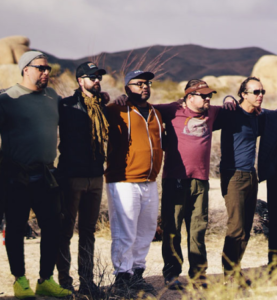
- Evryman
- Mankind Project
- 12 Step Groups (Google an addiction or support groups for family members) – this is where I first saw men being REAL with their emotions and were jaw droppingly authentic… these groups are also FREE and you get a mentor (“sponsor”) to help you with your growth. Moderation Management (for alcohol abuse) is a related option.
- There are of course alternatives to 12 step groups & empowering support groups for other life struggles. I just can’t list them all here. If you know of an excellent support group where men can be real, grow and heal, please let me know!
- Individual, Couples and Family Therapy~ to learn in “real time” by slowing down your interactions with others or conversation with me… so you can connect with the exact cues (internal and/or external) and self-talk (“story you tell yourself”) that increases or decreases your empathy & refine how to express empathy, in addition to experiencing more empathy from your loved ones- with my support- and empathy from me.
- Books~ Emotional intelligence by Daniel Goleman, The war for kindness: Building empathy in a fractured world by Jamil Zaki, Hold me tight and Lovesense by Sue Johnson (describes vulnerability & emotional responsiveness in the context of couples)
- Paul Ekman’s classes on emotion recognition that range from basic to advanced skills in identifying micro-expressions of emotions. Ekman is a psychologist and expert on universal emotions & non-verbal body language
- Find empathy role models! I promise they’re out there and will show up if you’re motivated, open and willing to learn.
- Be BRAVE and let your partner or family member know that you’d like to strengthen your empathy skills directly with their positive & constructive feedback (establish boundaries though, ex. once a day, once a week check or something else?) and indirectly through books, movies, etc.
One movie I recommend is called “Everybody’s Fine” with Robert Di Nero. You can pause it when emotion or empathy comes up for you to discuss with your loved one. One of the most powerful scenes for me was Di Nero in the train station in the middle of the night. (If it helps, refer to a list of emotions.)
Do you know an additional resource I should add to this list? If so, please email: [email protected]
Why is this blog is focusing on MEN?
- Out of all of my clients, MEN (& their significant others) more often express their concerns about: “not knowing how to show empathy”, “not doing emotions or vulnerability”, “not having a clue how to respond or comfort their intimate partner when they’re having a LOT of emotions”.
As a therapist, I have observed just as many women struggle with showing empathy for their intimate partner or family member. For all genders, empathy is an ADVANCED skill that requires openness to see situations from multiple perspectives (ideally considering dual empathy), reflection on your thoughts, willingness to feel the emotions of another person, and lots of practice.
Empathy Challenges for Men ~
1.) Disconnection from emotions & even aversion to showing emotions due to family/society neglecting to teach & de-valuing emotional intelligence in boys.
~ For more information about this challenge, see my other blog, “21st Century Relationship Skills”
2.) “We are conditioned (especially as men) to use our problem solving abilities with greater frequency or instead of our empathetic abilities.” – Will Bishop (CO therapist)
Unfortunately, “problem solving” (while extremely important in most endeavors in life) can CREATE more relationship issues because it’s the wrong tool for matters of the heart.
Bishop further explains in his blog on empathy:
In difficult times, often we really want someone to ‘just be there for us’ and to show compassion and understanding (empathy)… or we can feel worse, alone or misunderstood if our confidant goes into problem solving mode.
A humorous example of this common couple’s conflict (one partner needing empathy and the other offering problem solving) is a video called,
“It’s NOT about the Nail” (1 min, 41 sec) ~ Enjoy!
If letting go of what you know and do best (problem solving) seems daunting or even hard to trust, read on…
I genuinely want YOU to have the relationship success you long for, and this blog has many tools and practical information to help you strengthen your empathy skills.
Being empathetic (feeling WITH another so they’re not alone in their pain) begins with being able to FEEL our OWN emotions.
Yet, too many men say, “I DON’T ‘DO’ EMOTIONS because…”
- I’m an (fill in the blank) engineer, attorney, accountant, (or a different career)…
- *I’m logical, analytical, intellectual, Type A, a “problem solver”… (most common)
- My Dad said, ‘Emotions are … (weak)’ & ridiculed me. He didn’t model any vulnerability.
- My Mom seemed overwhelmed or didn’t know how to respond when I showed emotions, or similar to Dad, she encouraged me to “be tough” or to “solve” my emotions.
- When I showed emotions (other than anger) or vulnerability, other kids bullied/made fun of me.
- Even though my spouse says they want me to be vulnerable or show emotions, when I do, they (fill in the blank) don’t know how to respond, look surprised, laugh…
Underneath the statements above is the message that for some men~
- They didn’t experience anything beneficial from expressing their emotions– NO understanding, comfort, care, soothing, empathy, validation, support, needs met, etc.
- They were ignored when they showed emotions versus given praise for independence & attention when they expressed something intellectual or factual (ex. work, news, sports, etc.)
- They may have been harmed for showing emotions/vulnerability in abusive homes.
So, it makes sense that some men are disconnected from their emotions, vulnerability and attempts at relational coping in order to be safe, accepted & to lower their distress!
One of the hardest parts of this phenomenon is that most adults who experienced emotional neglect as children cannot recall it occurring because they likely repressed the pain of the neglect in order to cope.
Thus, they don’t realize that they’re missing a CRITICAL skillset in life (emotional intelligence)… until they receive feedback from a spouse, friend or boss who informs them of this missing skill.
By this time, the adult is likely a high performer at work (since this was valued growing up) and possibly has turned to substances, other addictions or other individual coping behaviors (including repressing their emotions) since it was NEVER safe or beneficial to turn to a loved one for emotional support (relational coping).
The relationship cost is HUGE because CONNECTION and especially bonding requires vulnerability and relational coping. Without a strong bond (for both partners), life can feel empty and lonely.
I have worked with MANY male (& female) clients who begin therapy at this crossroads~
Deciding to continue their life DISCONNECTED from (or unwilling to express) their emotions and vulnerability, which has helped them~
- Cope or even SURVIVE
- Belong
- Stay safe and protected (“I don’t need anything from anyone”, “I’m highly independent and low maintenance”)
- achieve career status and SUCCEED!!! (in several careers, ex. pilot, military, first responders, surgeon, medical professional)… Or achieve a certain level of career success, but then hit a “ceiling” due to their LACK of emotional intelligence (according to Daniel Goleman)
Or…
Choosing to be open and willing to take the BRAVE risk of befriending & sharing their inner world (*your attachment needs, fears and longings– see below…) to ~
- Be seen & finally understood!
- Get their needs met (as a result of expressing them more clearly)
- Experience much deeper CONNECTION
- Achieve BOTH personal and professional SUCCESS! (Most adults are able to put aside their personal lives when they’re at the workplace in order to be fully present and productive.)
Emotions are the messengers of LOVE!
[Thus,] in key relational moments, you have to send a **clear emotional signal… a “ping” to your partner [or family member] to strengthen your relationship, to create BONDING moments … because the LACK of a signal is the ultimate threat or even the DEATH of a relationship!
– Dr. Kathryn Rheem, EFT Trainer

BurningMan2015
*What are attachment needs, fears and longings?
Examples of attachment needs & longings: deep acceptance (ability to fully reveal ALL of you), closeness, understanding, comfort, safety, seen as good enough, felt sense of security, appreciated, to know loved one is “there” for you & you can reach to them and trust they’ll respond to you (in general)
Examples of attachment fears: lack of safety and security, rejection, abandonment, not measuring up or even feeling like a failure, emotional deprivation/lonely, not being valued or accepted, unlovable
**A “clear emotional signal” is:
~ a genuine emotion below the “iceberg of emotions” handout (anything deeper than numb/stoic, happy/”everything’s fine” and anger/frustration/irritation) – through words or body language.
~ Some individuals are better able to describe their emotional experience through their bodily sensations (Ex. “My stomach is in knots”) and/or through metaphor.
Men & Empathy 101
In order to connect with your partner, you have to first connect with yourself.
– Owen Marcus, a co-founder for Evryman (from his interview with former NY firefighter & police officer; now couples therapy trainer, George Faller, LMFT on “Men and Emotions”)
– Fyi- Neither Marcus, who identifies as having Aspergers, or Faller came from “touchy feely” families or would claim they were naturals in empathy.
Both men credit doing personal and relational work as essential to increase their emotional intelligence and effectiveness in guiding other men (& women).
Incentives for Men~
What motivates Men to learn & show more empathy and vulnerability?
- Challenge or competition (along with structure, safety & belonging in a group)
When one guy in our group takes a leap into emotional expression, the other guys say to themselves, ‘I’m not going to be left behind. I’m going to do that too.’
Guys honoring each other for their vulnerability is the antithesis to what they get in society – Owen Marcus (co-founder for Evryman)
- Practice/”reps”/training & the belief that empathy is a SKILL! (not a fixed trait)
We can grow our empathy…through practice! Decades of evidence demonstrate that when people think they can’t change something about themselves, they shy away from challenges. When they think they CAN grow, they open up instead. (Jamil Zaki in “You 2.0: The Empathy Gym“)
- Money
In Jamil Zaki’s TED talk (@ 8 min, 50 sec), he cites a study that showed how men’s emotion recognition skills increased (even surpassed women’s performance) when they were told they would get paid for their accuracy!
- Better relationships (for men & their partner/spouse)- personal & professional! Daniel Goleman’s research is clear that EQ is more important than IQ if you want to advance in ANY career. (Ex. Even a software engineer needs more adept people skills than coding abilities.)
- Men desire CONNECTION [just as women do]. – Owen Marcus
If you don’t know what you’re feeling, you can’t get your NEEDS met!
You also need to find language for what’s happening inside you (as hard as this is) because you fell in love with your partner, and you want to feel that again, and this is what she’s [or he/they] longing for, so we’re going to work on this.
– Kenny Sanderfer, the EFT “Cowboy” (TN Trainer & Couples Therapist who understands “withdrawers” and men who grew up in rural communities)
Strengths of Men related to Empathy~

1.) Ability to Compartmentalize Emotions for the Greater Good
Benefits of this skill~ able to perform certain tasks with the highest level of precision, focus, engage in compassionate empathy, & prevent burnout
When I think of medical professionals and first responders, I have deep gratitude for how they are able to put their emotions aside in order to most effectively serve the public. I honestly am not sure I could do this short-term unless it was for my own survival.
I view first responders’ need to lock up their emotions as a means to respond in the MOST empathic way to civilians and to be fully present for one another. Dr. Daniel Goleman, drawing from Paul Ekman’s (an expert on emotions and empathy) work, explains this exception in his article, “How Can Empathy Move Us to Action?”
Another example of heroic compassionate empathy that required compartmentalizing emotions is the work of Jeff Brodsky, the founder of Joy International, who described in his memoir how he had to repress his emotions during his undercover work to free children from being sex trafficked.
2.) Demonstrate Empathy in a VARIETY of ways that indirectly send a clear message of:
I feel you. I’m with you. I’ve got your back.
For example, in watching the videos or listening to the podcast above, I observed men showing empathy through~ Humor, sacrifice, strength, courage, willingness to go the extra mile, and through other actions.
I realize that this is an EXTREMELY brief list of strengths!!!
This blog will likely be an evolving process. I welcome, with gratitude, your observations of additional strengths I can add to this list. Please send your ideas to: [email protected]
A few of the most common obstacles (& solutions) that BLOCK this NATURAL process of EMPATHY~
(More obstacles and solutions are explained in my other blog: “Everything You Need to Know about Empathy~ To Have the Relationships You Long For”)

1.) Detachment/Misattunement/Ruptures & Lack of Repair
Two Powerful Video Examples~ that DO show the REPAIR process:
“Lovesense” (11 minutes)
~ This video illustrates the 3 steps in the “attachment” dance that both builds a secure bond and reflects its strength:
- Connect or Attune (empathize)
- Disconnect or Misattune (or rupture- looks like indifference or attacking)
- Reconnect or Repair (attune/connect again) ~ Couples and family therapists know this step requires empathy & is THE most important step in this natural process.
“The Still Face Experiment with Dads” (4 min)
- In “Lovesense”, experts Sue Johnson and Ed Tronick explain how this detachment (still face) between parents and babies can have the SAME catastrophic response in couples!!
- The Still Face Experiment with Dads corroborates Ed Tronick’s research and demonstrates that DADS have the SAME impact on their children and thus are just as important as Moms.
It’s critical to recognize the impact of real or perceived DETACHMENT on relationships:
When a loved one doesn’t know how to show empathy and, on the OUTSIDE, has a detached “still face” (or the slang ‘resting … face’), I witness in sessions a family member or partner claiming,
YOU DON’T CARE ABOUT ME OR MY FEELINGS!
What’s so sad is that the partner (more often men due to socialization) with the detached, still face, more often than not, GENUINELY DOES CARE about his loved ones. He just never learned HOW to express it verbally or NON-VERBALLY.
Remember~
Our brains are more likely to BELIEVE what we SEE (non-verbal body language) or SENSE (emotions due to tone of voice & energy) than a person’s words. This is how we SURVIVE and stay safe.
Often the MOST powerfully healing as well as insidious forms of communication are SUBTLE and NON-VERBAL. For example:
- Mirroring back a look of emotional pain can reflect “I feel for you.”
- One’s eyes lighting up when they see you can convey delight in you.
- On the other hand, a detached “still face” in response to your hurt or joy can imply that person doesn’t love or care about your joy or pain.
Solutions~
#1 Strengthen your attunement skills
Attunement Skills~ (Read & mirror body language to convey, “I hear you. I’m with you.”)
- Observe in the videos above (& especially through other evidenced-based relationship resources)– HOW the Parents and adult Partners attuned, responded & repaired with their loved ones.
- What did the Parent and male partner do & say to their loved ones to reassure them that they matter and that they care about them? How did they get back into connection and attunement?
- If needed, invest in strengthening your emotion recognition skills (“attunement”) through Dr. Paul Ekman’s online class that has shown that folks on the spectrum can get up to speed in less than one hour! Here is a link to Ekman’s classes that range from basic to advanced skills in identifying micro-expressions of emotions.
#2 Increase your awareness and effectiveness in being emotionally responsiveness
Emotional Responsiveness Skills~ (includes empathy)
- *Learn how to be more A.R.E. (accessible, responsive and engaged) in the book, Hold me tight by Dr. Sue Johnson & in couples therapy.
- Commit to increasing your emotional intelligence~ read books on personal and relational growth, join a men’s group, ask for and be OPEN to receiving honest, respectful feedback from your therapist/coach/mentor, and if you’re REALLY brave, from your loved ones too.
- Learn the M.O.V.E. Closer technique (see below)
#3 Fine tune your REPAIR strategies. Your relationships depend on it more than anything!
Repair Skills~ (less about fixing what’s broken and more about getting back on track via a menu of tools- attunement, empathy, validation, humble owning our part, remorse, etc.)
Repair is one of the MOST powerful ways to show you CARE about other people’s feelings! It’s about cradling their heart.
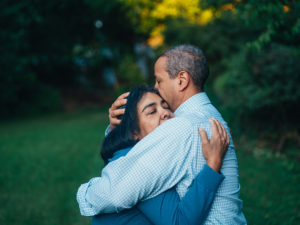
When someone emotionally hurts US (even unintentionally), we expect them to acknowledge their behavior, apologize, & show us deep empathy.
But then… when WE (unintentionally) hurt someone, we might revert to our protective coping behaviors (defensive, minimize, counterattack, etc.) that perpetuate negative cycles.
Worth reflecting on…
Learn how to “repair” with your loved ones~

Here’s a brief example that happened recently between my 11 year old son, Eli and myself. Even therapists who KNOW this can get “hijacked” emotionally and have missteps.
The hurt~ My family had an important guest coming to our house and I felt stressed trying to finish cleaning/organizing. I gave Eli his list of “to do” items, and then (in the middle of his cleaning), I remembered one more room that he needed to briefly clean up since some of his toys were in there too. Eli was cleaning away and jamming out to music until…
(Here’s our cycle…)I told him about the additional room. Eli responded, “But you promised you were going to give me the whole list at once! That builds my trust in you. I was hoping to play with a friend after finishing cleaning and now I won’t have time!”
The unsuccessful repair~ (NOT one of my finer moments) I yelled back, “Fine! Next time, I’ll have you walk around the entire house with me to make sure your list is complete and it’s going to be longer!”
The negative impact~ BOTH Eli and I felt angry and hurt, and began stewing as we continued cleaning. The NEGATIVE CYCLE causes both people to feel unheard, uncared for and ALONE.
The breakthrough… Eli came over to me, with some tears in his eyes, and said, “I can’t hold in these thoughts. I need to talk with you.”
Eli and I both sat down on couches across each other. I opened my heart. I told Eli I wanted to hear what he was thinking and feeling. Even though he was upset with me, he expressed himself more calmly when I gave him my full attention. I mirrored, validated and empathized with him. I acknowledged my part- going back on my word.
*Then, I got off my couch, moved across to his, told him how sorry I was and that I was so glad he came to me. Eli stood up, hugged me and said, “I love you.”
Finally, successful repair!
Note~ Even though I had, what I thought was “the solution” in my head, I kept it there because I know that when someone is in emotional pain, they rarely will be soothed by your logical solution.
Emotional distress needs emotional comfort.
And if you’re curious… Eli did clean that extra room. I have no doubt that what motivated him to go the extra mile (& have our connection strengthened) was that, at a KEY relational moment (a RUPTURE), I listened and responded to Eli with an OPEN heart (a successful REPAIR).
Quick Review:
To break out of these cycles of disconnection and distress … and get back to positive, loving connection~
PAUSE… Take a breath & connect with your heart to get your emotional balance…
Acknowledge your loved one’s hurt, pain and experience.
Make sure YOU are understanding your partner BEFORE you take a turn. And consider you might not even need to express “your side” to get back to positive, loving connection 😉
Baby, when you’re in pain, the world stops and I listen. – Dr. John Gottman
Masters of relationships repair early and often and have lots of strategies for how to repair.
Gottman describes a repair attempt as “any statement or action — silly or otherwise — that prevents negativity from escalating out of control.” – Zach Brittle (therapist)
- If the concept of “Repair” seems too elusive to you, Google and print out Gottman’s “Repair Checklist” for concrete ideas and read this brief article, “R is for Repair“.
ALL of the evidenced-based relationship therapy models have found~ It’s not the mistake that ENDS RELATIONSHIPS. It’s the LACK of REPAIR.
2.) ANGER, NUMB, or “I’M FINE”- Staying above the “water line” (Hiding vulnerability & your REAL emotions)
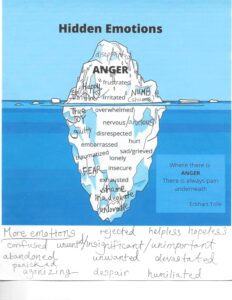
Too often I see the most common couples “negative cycle” – one partner showing anger and the other stoicism. Sadly, neither of these emotional presentations evoke the empathy and closeness that the couple longs for.
When partners (or family members) ONLY show anger and numb (their protective armor) or send a SCRAMBLED SIGNAL- their words say one thing, but their emotions or behaviors express the opposite, loved ones still code them as “not safe” and/or confusing and are NOT able to effectively respond.
Solutions~
#1 To get more EMPATHY, you have to TAKE the RISK in letting yourself (vulnerable inner world) be seen!
You must take off your “armor” (emotions & related behaviors above the water line.)
In EFT (Emotionally Focused Therapy), we do this VERY slowly to build safety. I ask my clients to just “dip your toe in the water” in showing vulnerability- authentic emotions (below the water line) & thoughts (if they’re the speaker) and (if they’re the listener) try to remain as empathetic, open and curious as possible.
#2 To experience feeling “seen, heard & understood” & to get your NEEDS met, increase your awareness of the impact of showing or hiding different emotions~
While ALL EMOTIONS are IMPORTANT signals to ourselves and others (of our internal state and needs & others if we attune to them) and provide VALUABLE information…
There are certain emotions that draw us CLOSER to people (& animals) & often elicit EMPATHY, while other emotions REPEL us (especially if it’s directed toward us).
Below are a few emotions, their functions and impact on our relationships:
ANGER– evokes assertion & moves us toward goals
- Anger also is a call for (& HOPE) for change, in addition it propels us to fight or defend ourselves or others as a form of protection.
- While anger can unite people fighting for an important cause, if it’s directed toward our loved ones, it tends to scare/repel/shut down or provoke others to fight.
When we observe anger cues from humans or animals, we tend to automatically experience a fight or flight coping tendency in response to our emotions of anger or fear. This impedes empathy.
Sue Johnson has underscored the impact of one’s tone of voice with this example~
- When an intimate partner shouts at their loved one, “DO YOU LOVE ME?!!!”, they’re NOT likely going to receive the loving and compassionate reassurance that they long for.
Versus-
- When an intimate partner gently and with some anxiety asks their loved one in a softer voice, “Do you love me?”, they’re more likely going to receive the caring reassurance they need.
*As explained in the video, Lovesense~
ANGER is often expressed as a protest of the disconnection between loved ones, and underneath it are the softer emotions of sadness, fear and hurt.
Anger can also be expressed as a “shield” or form of protection when a partner feels shame or fear in response of criticism from the one who matters most.
SADNESS– evokes withdrawal or seeking support and comfort
- When vulnerably expressed, sadness draws others closer to us. While some introspective or energy conserving withdrawal is needed, COMFORT by an attachment figure is the MOST HEALING MEDICINE.
- The courageous challenge and risk is to show this vulnerable emotion & REACH to loved ones for comfort and empathy. The benefits are tremendous- healing + bonding!
When we observe sadness cues from humans or animals, we tend to be drawn closer to them to provide comfort/support. This increases empathy.
BLOCKS to providing comfort, care and closeness can still appear, even in response to this “underbelly” emotion. For example:
- Emotion of fear driven by the thought, “I don’t know what to do to soothe my partner!”
- Emotion of anger influenced by the story, “He’s always upset about something! I can never make him happy.”
When BLOCKS come up… it’s most helpful to be CURIOUS and go INSIDE (to your bodily sensations, emotions and thoughts- “Stories you’re telling yourself”) & notice your resulting coping behavior on the OUTSIDE, and the IMPACT on your relationship, you and your loved one.
FEAR– primarily evokes fleeing, freezing or going to someone for connection/comfort.
- Other responses researchers have found are hiding and “fawning” (pleasing) and some humans and animals will fight. These are all normal SURVIVAL strategies.
When we observe vulnerable fear cues from humans or animals, we tend to be drawn closer to them to provide comfort/support. This increases empathy.
Similar to sadness, BLOCKS to providing comfort, care and closeness can still appear, even in response to this vulnerable emotion.
When BLOCKS come up… it’s most helpful to be CURIOUS and go INSIDE (to your bodily sensations, emotions and thoughts- “Stories you’re telling yourself”) & notice your resulting coping behavior on the OUTSIDE, and the IMPACT on your relationship, you and your loved one.
3.) Empathy sounds so simple… until the “cycle” takes over.
In personal relationships, EVERYONE wants to RECEIVE empathy, yet stop giving it when they’re caught in negative cycles because we see ourselves as the “victim” & our family member or partner as “the bad guy”.

The negative cycle is the biggest block of all….
I’m right, you’re wrong!
This is fact, logic, the truth. (except that relationships involve our heart- needs, longings and struggles)
I’m kind, you’re mean!
I’m innocent/the hurt party, you need to change!
I’ve done MY personal/spiritual work, but you haven’t..!
For more information about the “Cycle”, see my other blog called, “Transform your vicious cycle into positive loving connection”.
When loved one’s get stuck in their negative cycle of conflict or distance, it’s not due to a lack of LOVE…
It’s a pattern of scrambled signals and a lack of EMPATHY.

3 final ways to strengthen empathy in your relationship
The first step toward being empathic and acting compassionately is to recognize how someone is feeling, and in particular when they are suffering. ~ Paul Ekman
1.) Strengthen Your Emotion Recognition & Emotionally Responsive Skills:
- In EFT and PACT therapy, we slow clients down so you can connect to your internal world (bodily sensations, emotions and thoughts not being expressed) & we also reflect what we’re seeing on the outside of the client and how they might be sending mixed messages (ex. laugh when they’re in pain, show anger when they’re expressing sadness).
- Dr. Ekman’s online micro expression training tools curriculum (has even taught individuals on the “spectrum” emotion recognition in just 1 hour.)
- Watch episodes of “Lie to Me” (based on Ekman’s work)
2.) Take turns putting yourself behind the desk of the “Empathy Department” (vs. complaint department) to solely focus on understanding & showing empathy.
- Use the acronym~ M.O.V.E. (closer to the one you love 🙂 [drawn from Harville Hendrix and Terry Real]
Mirror the words you’re hearing (paraphrase the story & repeat back some of the key words) and the emotions your loved one is expressing or you feel inside, & sometimes non-verbal body language.
Open your heart and mind (before, during and after the talk)- breathe & meditate before a hard talk & trust that the more open & curious you are, the more your loved one will feel heard and seen.
Validate– ex. “That makes sense …”, “I can understand…” (You are NOT agreeing, just showing understanding); This helps individuals lower their defenses and open up more. This skill is similar to cognitive empathy.
Empathize– ex. “This is so frustrating!”, “This sounds painful.”, “I can see your (emotion or bodily sensation, ex. tears)”; Conjecture more vulnerable emotions if your loved one is only showing the mask of anger, laughter, or stoicism, ex. “I imagine I would also be feeling (emotion)”, Let yourself be MOVED to FEEL WITH your loved one! Sometimes mirroring NON-VERBAL body language helps.
- Every few sentences or whenever you need your loved one to pause, use one of the M, V or E skills.
- Use the O skill throughout your talk
- Keep checking in, “Am I getting it?” “Does it seem like I’m understanding?” “Is there anything more?”
- If your loved one is NOT sharing anything about their INNER WORLD, ask, “What are you feeling or saying to yourself on the INSIDE?”
- Once your agreed upon time is up, the LISTENER behind the desk needs a break, and/or ideally the loved one feels heard, PAUSE, take a break and then switch roles.
3.) Relational coping or “co-regulation”, which is the ability (or SUPER POWER) to calm, comfort, soothe other people.
Dr. Stan Tatkin, creator of the PACT (Psychobiological Approach to Couples Therapy) Model identifies the slowest to the fastest ways you can c0-regulate your partner/family member.
Slow ways…
- Lengthy speech (explanations, logical reasons, excuses)
- No response (no utterances, no gestures, still face)
- [Expression of vulnerable longings or needs, but still escalated or gentle, but still blaming]
Fast ways…
- Few but precise words (“Okay”, “I’m sorry”, “You’re right”)
- Direct, concise reparative speech (“I really appreciate what you did”, “I’m so grateful you’re in my life”)
Fastest ways…
- Non-threatening physical movement forward (proximity)
- Non-threatening touch (hand, leg, shoulder)
- Facial expression (empathic, friendly)
- Empathic vocal tone (prosody; soothing tone we naturally use with babies & animals)
- [Eye contact]
Empathy 101… for ALL Genders
Below is just a super brief overview ~
For MUCH more information, see my blog, “Everything You Need to Know about Empathy~ To Have the Relationships You Long For”
3 Different Types of Empathy (Ekman & Goleman)
1.) Cognitive Empathy (or emotional & thought recognition)– knowing what the other person feels and what they might be thinking; perspective-taking. [This is a step beyond problem solving.]
2.) Emotional Empathy (or emotional resonance)– feeling what the other person feels because we’re attuned to another person’s inner emotional world. We allow ourselves to be MOVED by another person’s emotion, which reflects to another person, “I feel you. You’re not alone in your pain (or joy).”
3.) Compassionate Empathy– We not only understand a person’s predicament and feel their vulnerable emotions with them, we are also spontaneously moved to help if needed. Ekman explains this is propelled by the belief that “WE’RE ALL CONNECTED”.
Origins of Empathy
If your learning style is experiential, try this POWERFUL EXERCISE I will guide you through in this video from 2:41 to 15:18 (just 13 min). Click on the video link below & skip to 2:41.
Video Link: How we Learn (or don’t learn) Empathy within our Family
Although I don’t use the word empathy in this video, it is very similar to the skills of:
- attunement (the ability to read and feel other’s emotions & understand what they’re thinking)
- responsiveness (the ability to “mirror” non-verbally & verbally, comfort, provide care, support, validate &/or just provide your presence so your loved is not alone in pain).
Most couples with one or both partners who didn’t experience a secure bond with their early attachment figures need the support and guidance provided in couples therapy and/or a couples workshop to develop “a new attachment dance”. To schedule a free consultation, click here for my calendar.
Empathy begins ~ virtually from the day we’re born!
(from Daniel Stern’s research in Daniel Goleman’s book, Emotional intelligence)
Factors that nurture empathy (or indifference) in children
Of all such moments, the most critical are those that let the child know their emotions are met with empathy, accepted and reciprocated, in a process Stern called attunement.
Through attunement, mothers let their infants know they have a sense of what the infant is feeling. For example, a baby squeals with delight and the mother affirms that delight by cooing or matching the pitch of her voice to the baby’s squeal. Such small attunements give the infant the reassuring feeling of being emotionally connected.
The Costs of Misattunement (Stern)
When parents are [repeatedly] misattuned to a child, it is deeply upsetting. Prolonged absence of attunement between parent and child takes a tremendous toll on the child.
When a parent consistently fails to show any empathy with a particular range of emotion in the child- joys, tears, [fears] needing to cuddle- the child begins to AVOID expressing and perhaps even feeling those same emotions.
Through reparative relationships, there is hope!
Healing corrective experiences can occur between an adult and… an intimate partner, a sponsor or mentor, a therapist, a friend, possibly a colleague, etc.
Having someone in your life who can be a “STRONGER, WISER, KINDER” other who you can TURN TO in moments of distress and they can comfort you, as well as DELIGHT in you and amplify your joy! (In equal relationships you can take turns in this role)
“Ordinary People” (1980 film)
In the powerful film, you’ll see examples of the healing balm of empathy & the chilling costs of detachment that is finally acknowledged as a result of a shattering loss.
Too often individuals try to HIDE their human imperfections and pretend to the outside world (or even their spouse or family) that “I’m FINE” and “We’re FINE”. “No problems here.” Or, “only YOU have the problem, not me.” However, when crises hit or other life transitions and milestones occur, the real TRUTH of the couple and family surfaces.
I have come to learn that these crises can be opportunities for tremendous growth and healing, which strengthens your bond! Or, if family members are UNWILLING to do any honest self-reflection and growth and really listen with their heart to their loved ones, relationships can unravel.
As you watch or reflect on this film, notice:
- Who shows empathy? How? What impact does this have on their relationships?
- Who does NOT show empathy? What did they do instead? What impact does this have on their relationships?
In closing
Whether you identify as male, female, non-binary, or something else, we ALL can benefit by learning (or affirming) skills and information about empathy.
Our children deserve emotionally intelligent role models. For more information on breaking this cycle, you can also check out my blog, “21st Century Relationship Skills“.
Why is EMPATHY so important in intimate relationships?
Empathy shows you understand and CARE about your family member/partner.
It means that you are able to put yourself in their shoes to understand them, feel their emotions and support them through comforting behaviors or demonstrate other forms of attunement and compassion.
When BOTH partners or family members feel SAFE, SEEN, HEARD and RESPONDED TO (with empathy), they can experience the caring and closeness they long for through BONDING MOMENTS.
Would you like support in receiving more empathy in your relationships?
Contact Lana Isaacson, LCSW, CAS at: lanaisaacson.com & To schedule a free consultation, click here for my calendar

